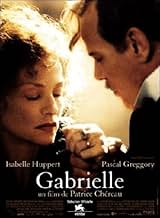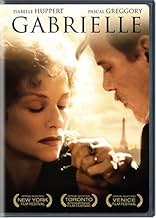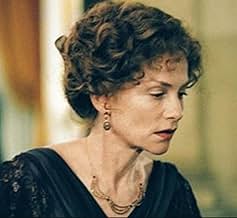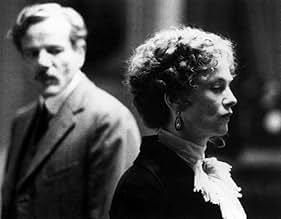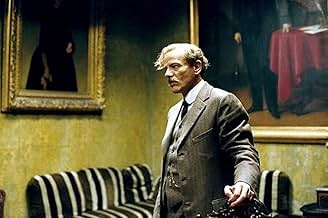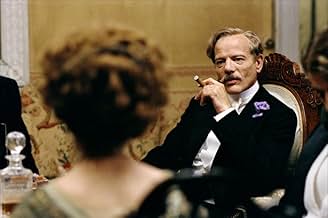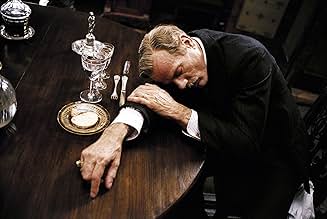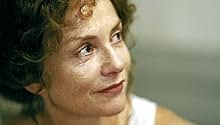Gabrielle
- 2005
- 1h 30min
NOTE IMDb
6,2/10
2,2 k
MA NOTE
Le mariage entre Gabrielle et Jean commence à s'effilocher après la découverte d'une lettre qui appartient à Gabrielle.Le mariage entre Gabrielle et Jean commence à s'effilocher après la découverte d'une lettre qui appartient à Gabrielle.Le mariage entre Gabrielle et Jean commence à s'effilocher après la découverte d'une lettre qui appartient à Gabrielle.
- Réalisation
- Scénario
- Casting principal
- Récompenses
- 3 victoires et 6 nominations au total
Florent Bigot de Nesles
- Invité
- (non crédité)
Philippe Calvario
- Guest
- (non crédité)
Avis à la une
Gabrielle (2005) is a French film written and co-directed by Patrice Chéreau. It's based on a novella by Joseph Conrad.
Pascal Greggory plays Jean Hervey. He's a very wealthy businessman. He's healthy and apparently happy.
His wife, Gabrielle, is elegant and sophisticated, albeit aloof. Gabrielle is portrayed by Isabelle Huppert.
This movie sounded good on paper, but it just didn't work for me. Partly that's because Patrice Chéreau is better known as a theater director and the film looks more like a play than it looks like a movie.
Huppert is one of my favorite actors, but she's wrong for this role. We're told over and over that the couple has been married ten years, but Huppert looks closer to 50 when, in context, she should be 35 or 40. (Well, she was 52 at the time, and she has every right to look 50, but it's not appropriate for this movie.)
Finally, director Chéreau uses strange and unnecessary devices. He switches from black-and-white to sepia to color. He uses title cards like the old silent movies. The characters talk and talk, but nothing much gets said.
If a film isn't going to be enjoyable, it should teach us something. All I learned from this movie is that if you speak cruelly to your maids, they just have to bear it. Apparently, it's part of the job description to just endure.
I didn't enjoy any aspect of this film. It's hard for me to criticize an Isabel Huppert movie. I thought she could make it work. Not this time. Gabrielle has a dreadful IMDb of 6.4. I agree with my fellow raters and rated it 6.
Pascal Greggory plays Jean Hervey. He's a very wealthy businessman. He's healthy and apparently happy.
His wife, Gabrielle, is elegant and sophisticated, albeit aloof. Gabrielle is portrayed by Isabelle Huppert.
This movie sounded good on paper, but it just didn't work for me. Partly that's because Patrice Chéreau is better known as a theater director and the film looks more like a play than it looks like a movie.
Huppert is one of my favorite actors, but she's wrong for this role. We're told over and over that the couple has been married ten years, but Huppert looks closer to 50 when, in context, she should be 35 or 40. (Well, she was 52 at the time, and she has every right to look 50, but it's not appropriate for this movie.)
Finally, director Chéreau uses strange and unnecessary devices. He switches from black-and-white to sepia to color. He uses title cards like the old silent movies. The characters talk and talk, but nothing much gets said.
If a film isn't going to be enjoyable, it should teach us something. All I learned from this movie is that if you speak cruelly to your maids, they just have to bear it. Apparently, it's part of the job description to just endure.
I didn't enjoy any aspect of this film. It's hard for me to criticize an Isabel Huppert movie. I thought she could make it work. Not this time. Gabrielle has a dreadful IMDb of 6.4. I agree with my fellow raters and rated it 6.
French language period set chick flick that was so banally turgid and pretentious that I wanted to scratch thine own eyes out in those brief lucid periods I was awake. One thing I did share with what I expect the females in the audience were experiencing was the shedding of tears, the stark difference being that mine were tears of blood. If it had been a play I would have rushed out, brought a gun, then rushed back to shoot the actors on stage for in my opinion they deserve nothing but death. Put briefly, in turn of the century Paris a rather arrogant man rather abruptly finds out that his wife of 10 years desires to leave him for another man. Much talking is done. Then much more talking is done. This is followed by lengthy periods of talking. More talking. Then wrapped up with, surprisingly, talking. But it's all done in an almost monologue method , briefly interspersed with large titles on screen which I expect the makers of the movie thought to be profound yet I found completely ridiculous (the film ends with the words "AND HE NEVER RETURNED!". I thought it rude of me to puke on the floor of so gorgeous a theatre (the State in Sydney, such a beautiful and elaborate place) so I resisted with all my might). I left the cinema with a headache. Not in any way due to the complexity and depth of the story I'd just seen, but because I just wasted what I now consider to be the most valuable 90 minutes of my life ever. Even now I want to cry.
I see a great number of art-house films, so I'm not a pop culture heathen and I own many great titles in my own private DVD collection that I watch and treasure. I have nothing against glacial pacing, indeed for many wonderful films it is often delicious to slowly savour the unfolding occurrences (In My Fathers Den, Lantana, Insomnia, Mar Adentro etc) and my own favorites are indie films like Requiem For A Dream and Mysterious Skin (tho honestly a film one need watch only once due to its power and disturbing subject matter). But in this instance I would never have thought a "French language art-house drama" would be the type of film that in my opinion, gives the Adam Sandler film The Waterboy a run for it's money.
Complete dross.
I see a great number of art-house films, so I'm not a pop culture heathen and I own many great titles in my own private DVD collection that I watch and treasure. I have nothing against glacial pacing, indeed for many wonderful films it is often delicious to slowly savour the unfolding occurrences (In My Fathers Den, Lantana, Insomnia, Mar Adentro etc) and my own favorites are indie films like Requiem For A Dream and Mysterious Skin (tho honestly a film one need watch only once due to its power and disturbing subject matter). But in this instance I would never have thought a "French language art-house drama" would be the type of film that in my opinion, gives the Adam Sandler film The Waterboy a run for it's money.
Complete dross.
9RNQ
Patrice Chéreau and his team continue to amaze. Their recent movies--"Intimacy" and "Son frère"--have been wild, and Isabelle Huppert has played some wild roles too. But "Gabrielle" is a masterpiece of control, an equal of the studio movies of Fritz Lang in the 1940s. A benchmark is Hitchcock's "Rebecca." Like those movies, every shot here, each turn of the head, is a statement of emotion (and a test of the actors' skill). Now not only music tells what the characters are doing, light is further nuanced with color. The almost-homage to black-and-white is astonishing, because it can also be lit into color, showing the characters' being forced to be here and now without escaping to old assumptions: a bitten lip bleeds red, a serving woman elaborately brings a softly glowing lamp upstairs. (A friend objects that the house has electricity, but the same friend puts candles on the dinner table, and this lamp has a purpose.) There's a thesis in Film Studies for the communicative devices of each scene and what is referenced, like the way there is a less flamboyant version of scenes in Ruiz's "Le temps retrouvé." But then being restrained is the theme, and the tension is extreme without any thunderstorm or overt thrill (a thrill for these characters might be the horror). If the source story was Conrad's homage to Henry James, here is a movie worthy of their capacity for narrative of the highest watchfulness and precision. Stay totally alert, movie goers.
This up close study of a marriage in crisis is Chereau at his subtle, rich best. The infant terrible of '82 Bayreuth has matured into a maestro of cinema.
Gabrielle wants more but is unwilling to spend the effort or pay the price to get it. Her husband wants less and will settle for nothing less than less. The machinery of their marriage was running so flawlessly that it required no work by either and only modest attention. Their relations were on automatic pilot and they both seemed massively content to keep it that way. Then the machinery, briefly but ruinously, goes crazy.
Huppert and Greggory are riveting. And, not counting the credits, run time is less than 90 minutes. Good artistic judgment there by Chereau. Any longer and this film could be painful for the viewer. Jim Smith
Gabrielle wants more but is unwilling to spend the effort or pay the price to get it. Her husband wants less and will settle for nothing less than less. The machinery of their marriage was running so flawlessly that it required no work by either and only modest attention. Their relations were on automatic pilot and they both seemed massively content to keep it that way. Then the machinery, briefly but ruinously, goes crazy.
Huppert and Greggory are riveting. And, not counting the credits, run time is less than 90 minutes. Good artistic judgment there by Chereau. Any longer and this film could be painful for the viewer. Jim Smith
Obviously we don't all like the same things. One commentator said it was all just talk, as if that were a bad thing. I happen to love language and words, and in particular love the French language. So that is the reason I rent a movie in French. I also have a very strong aversion to "action movies" where language is reduced to "Ow! Help! Duck!" On the other hand, movies like Gabrielle where minute movements of the psyche are explored in depth by minimalistic means, these are what grip me, move me, keep me interested. I do not really think the movie is like an opera -- it was more like a french play -- the delivery and velocity of the spoken word was very much in the style of french live theater.
My only caveat is that French-ness and Conrad seem a strange mix to me. There was another French movie that was made on a Conrad text, and I had a similar reaction. Conrad is not writing about French society. And yet the action has been transplanted to France. And it seems an entirely incongruous transplant to me -- plopping the joyless uprightness of puritanical England (the only place name mentioned is "West End Station" into a such a lively Latin culture which has always had a much more relaxed attitude towards love and sex... well,to me it's just incongruous.
Nevertheless, it was an cleverly crafted movie, and the musical score by Fabio Vacchi was unearthly beautiful.
My only caveat is that French-ness and Conrad seem a strange mix to me. There was another French movie that was made on a Conrad text, and I had a similar reaction. Conrad is not writing about French society. And yet the action has been transplanted to France. And it seems an entirely incongruous transplant to me -- plopping the joyless uprightness of puritanical England (the only place name mentioned is "West End Station" into a such a lively Latin culture which has always had a much more relaxed attitude towards love and sex... well,to me it's just incongruous.
Nevertheless, it was an cleverly crafted movie, and the musical score by Fabio Vacchi was unearthly beautiful.
Le saviez-vous
- ConnexionsReferenced in New York - Section criminelle: Blind Spot (2006)
Meilleurs choix
Connectez-vous pour évaluer et suivre la liste de favoris afin de recevoir des recommandations personnalisées
- How long is Gabrielle?Alimenté par Alexa
Détails
Box-office
- Montant brut aux États-Unis et au Canada
- 332 829 $US
- Week-end de sortie aux États-Unis et au Canada
- 30 676 $US
- 16 juil. 2006
- Montant brut mondial
- 2 775 311 $US
- Durée1 heure 30 minutes
- Couleur
- Mixage
- Rapport de forme
- 2.35 : 1
Contribuer à cette page
Suggérer une modification ou ajouter du contenu manquant


